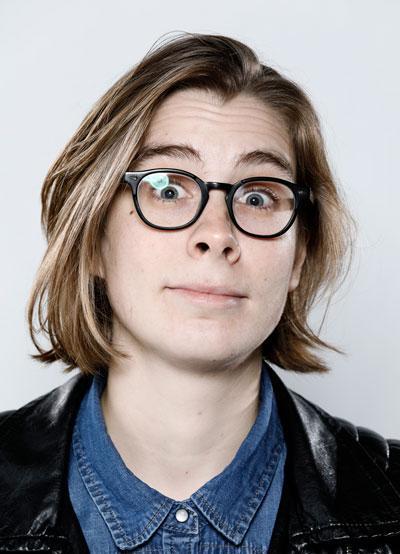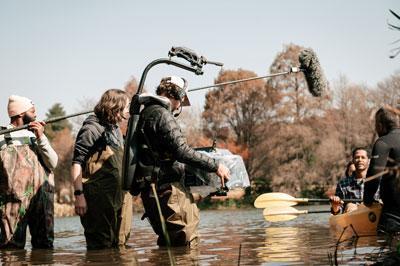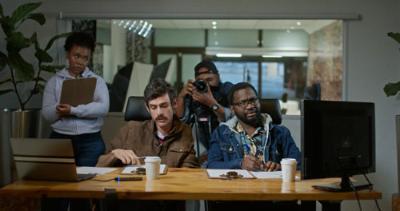A slice of contemporary life in Joburg
- Heather Dugmore
Samantha Nell's first feature film, Do Your Worst, premiered on Netflix in March, and is being screened in over 190 countries.
Thirteen years since she graduated, Samantha Nell (BA DA 2010) feels ready to explore whether she can work and make films in the United States and also raise finance there for films to be made in South Africa, including for the booming TV market. “Five years I would be very jealous of where I am now,” she says. “I would love to return to Los Angeles. I’ve spent a bit of time there and everyone talks film all the time, which is ideal for me.”
She has made short films (under 45 minutes) on four continents and, this year, the first feature film she has directed, titled Do Your Worst, premiered on Netflix in March this year, and is being screened in over 190 countries.
“Netflix bought the film and has licenced it for a number of years,” she explains. “We could not have made it without this deal; it covered a large portion of the production costs, and, thanks to our producer Bongiwe Selane, we were also able to access the tax rebate from South Africa’s Department of Trade and Industry.”
The budget was very tight and dictated only 18 days of filming. “It was a feat of planning between Bongiwe, cinematographer, Pierre de Villiers, and myself.”
Filmed all over Joburg Do Your Worst, is a slice of contemporary life in Joburg.
“I’m a born and bred Joburger and we recognise our imperfections. We live in a place that is not okay and yet it is also very okay, because while we acknowledge we’re a mess and that life is messy, we get on with things, and love and care for each other anyway.” This inspired the theme which Samantha describes “a mix between the comic and the tragic, it’s about ourselves and our friends, and the friends we don’t tell our parents about.”
Wits alumni feature prominently in the movie. Shannon Esra (BA DA 2004) plays the lead Sondra, “a struggling actor and professional mess, who faces the consequences of her bad decisions.” One of the male leads, Wayne van Rooyen (BA DA 2005), is also a Witsie, as are several of the secondary characters: Claudine Herman, née Ullman, (BA DA 2009, PDip A 2012) Jefferson Shabalala, Sharon Spiegel-Wagner (BA DA 2006), and the casting director, Roberto Pombo (BA DA 2009, MA DA 2019).
Samantha has always wanted to make films, and got hooked on musicals as a child. “After matric, I looked around as to where I should study film and I liked the Wits programme.” She also have an allegiance to Wits as her parents are Wits alumni; her father Matthew studied urban planning and her mother Barbara studied business and human resources.
“Wits gave me the critical thinking I needed for filmmaking and I have carried this with me in every part of my writing and directing process,” she explains. “Film school was also my first opportunity to make films, try things out and mess things up – university gives you that permission. It was also a wonderful opportunity to start creating a network and I have remained in contact with many of my Wits peers. The Witsie I’m closest to is director/screenwriter Mark Middlewick (BA DA 2010) who is successfully making films and adverts. Several of us do both. Advertising is the bread and butter of the industry here and it is a great way to hone your craft, work with budgets and service clients.”
WARNING: Clip contains strong language
Samantha adds another significant attribute of the Wits film programme during her degree was its student exchange programme with New York University (NYU) and partner institutions worldwide. “In third year you have the option of doing a 12-week course at NYU or one of its partner institutions, and I applied to Arcada University in Helsinki, Finland.
She describes Finland as “a very functional society in a Nordic way”, and the upside was that it was bright and sunny as she was there in summer. “What struck me, though, is the coldness and individualistic character of the people, which is so different to South Africa where we engage a lot with each other, and it’s quite natural to greet strangers in the street.
“But, the programme was fantastic and while I was there I made a short documentary called A Kosovo Fairytale, about a refugee couple from Kosovo who were smuggled into Finland in a truck, but they were unable to bring their youngest child as he would expose them if he cried. They had to leave him with his grandparents, though they did eventually get him to Finland after a couple of years.”
Samantha had previously made a short documentary in Joburg along similar lines called Land of Milk and Honey about refugees from Zimbabwe who were being housed in the Central Methodist Church.
After graduating from Wits, she spent a year teaching English in Korea, and went on to do her Masters over three years at NYU’s Tisch School of Arts Asia in Singapore. “Singapore works well and is clean and very strict, with rigid governance, but the people and food are wonderful. There’s an exciting youth arts culture and at the school we were free to create any content we wanted for our short films.”
On her return to South Africa she made a short film called Stiff, about an undertaker in Soweto who struggles to deal with people emotions around death. It’s dark comedy and not far-fetched in South Africa, as the body of a well-known politician gets misplaced, and the mourners end up with the body of a stranger.
Stiff was selected for Focus Features’ Africa First Programme, and it premiered at the 2014 Palm Springs International Shortfest in California, and subsequently won best short film at the Africa International Film Festival in Nigeria.
“Palm Springs was the first international film festival I attended and it was incredible to be there and meet so many filmmakers from around the world,” Samantha explains. “Stiff went down well in Palm Springs, and people laughed where they were supposed to laugh, which was a relief. What was fascinating is that so many people still think of Africa as place of magic and ritual. They wanted to know if the embalming in the movie was a special ritual, and I replied to the contrary, it was just standard embalming.
“While I was there, I also visited Los Angeles and had the privilege of producing a short film for an NYU colleague, called The Tortoise, about a sex offender trying to reconnect with his daughter.”
She loved being in Los Angeles, “it’s definitely a network business though, and hard to capitalise on the network if you don’t live there, but at the same time it’s not a great idea to move there unless you’re sure that you can support yourself.”
Towards achieving this, she participated in the Cannes South Africa Film Factory in collaboration with director Michael Wahrmann from Brazil. Their short film The Beast, which they co-wrote and co-directed, premiered at the Directors’ Fortnight in the 2016 Cannes Film Festival and was subsequently nominated for a Brazilian Academy Award. The Beast is a satire set in a Zulu cultural village in KwaZulu-Natal where the lead actor who plays Shaka in the cultural village performance, wants to do Shakespeare and is annoyed that no one will cast him as Hamlet, only as Othello.
“Cannes was incredible, a whole different experience as the European cinema world is very different to the American cinema world, which is predominantly commercially-funded. In France, it’s a huge point of pride for the government to finance films. I met incredibly interesting people there, and it opened a lot of doors to European producers and to talent labs, which is how I got to be invited to the Toronto Film Festival and Locarno Film Festival in Switzerland.
“In Toronto they ran a series of master classes where we heard incredible filmmakers speak about their work, like Ruben Östlund who wrote and directed Triangle of Sadness, a dark comedy which won a Palme d’Or at Cannes in 2022 and a number of other prominent awards.
At the Locarno Film Festival she met Ken Loach who directed I, Daniel Blake which also won the Palme d’Or at Cannes. “He is one of the gentlest, most wonderful humans in the world. He talks about empathy; that filmmaking is about connecting the audience to the empathy of the characters.”
Samantha’s next short film Love Motel was shot on location in Daejeon, South Korea, and premiered at the Durban International Film Festival in 2017. Over her career she has made short films on four continents (Africa, Asia, Europe and North America), and her feature film in South Africa. She is currently developing her second feature film, Miles from Nowhere; “a dark satire set in a Jewish old-age home in Johannesburg that must tackle integrating with other cultures”.
Within a year she’d like to see what she can do in LA: “LA is the hub of film production, and I want to meet with certain management and talent agents. If you don’t have access to these it’s almost impossible to make films there. I’m in conversation with some, but I’ll have to see what my prospects are like once I’m there and what the future holds.”


